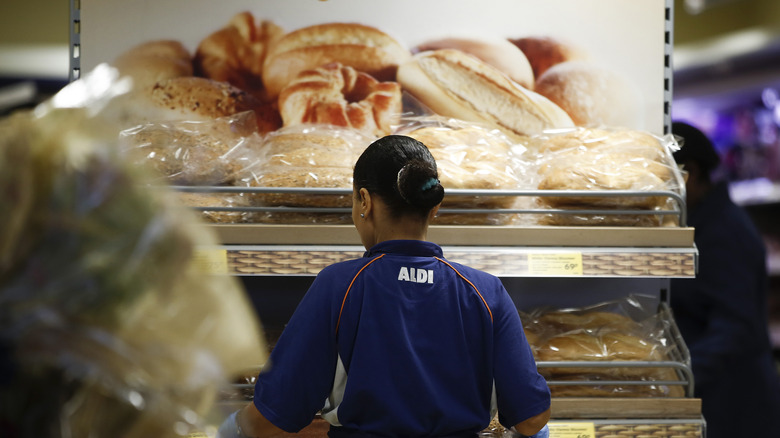Why Bread Is So Cheap At Aldi
In the realm of budget-friendly grocery shopping, Aldi stands out for its remarkably cheap grocery prices and the ease of scanning products, particularly when it comes to bakery staples like bread. Aldi's method is to reduce the cost of bread as it nears its sell-by date: a clever maneuver that benefits both shoppers looking for deals and the store's need to manage its product stock. This practice is part of the overarching strategy at Aldi, which focuses on minimalistic store design, a focus on exclusive brands, and an operational model that keeps overheads low and savings high. By selling mostly its own brands, Aldi maintains strict control over production and supply chain costs.
This unique business model and top-notch inventory management allow Aldi to pass significant savings (including on its bread) on to its customers. What's more — Aldi's rigorous product testing ensures that despite the low prices, the quality remains high, debunking the myth that lower prices mean lower quality. These strategies collectively contribute to Aldi's ability to offer affordable groceries without compromising on quality or freshness at a time when, despite lowering inflation, American groceries are still expensive.
The chain keeps prices low with a few different practices
Aldi's customer shopping experience is one-of-a-kind. It's designed to keep costs low, directly affecting the prices of items like bread. In fact, its ever-popular private-label L'oven Fresh brand of bread is touted for its taste and low price, all made possible due to that exclusivity.
In addition to in-home brands, the store's layout is straightforward, making it easy for shoppers to find what they need without unnecessary frills — in Aldi's case, this means less signage to indicate areas of the store, allowing your journey to be intuitive and more efficient. Despite being a bigger chain, Aldi tends to focus on locally sourced products to cut down on transportation costs for items like meat.
The store also allows customers to participate in efficient cost-cutting practices, such as bagging their own groceries and using a quarter to release a shopping cart, which is refunded upon the cart's return. These processes reduce the need for extra staff and help Aldi maintain its low prices.
Why Aldi's low prices don't work for everyone
While Aldi's strategy of reducing bread prices close to the sell-by date helps keep costs low, it does mean that the bread may not last as long once you bring it home — though, stale bread makes for excellent gooey breakfast strata. This rule stands for most of its items, particularly its produce and meat. Additionally, while cost-effective, Aldi's focus on exclusive brands can limit consumer choice, especially for those loyal to specific national brands. If you're looking for tons of brand options, Aldi's not your store.
On top of your limited options, the simplified store layout and self-service model, including bagging your own groceries and renting a cart, may not appeal to every shopper, particularly those who value a more "traditional" grocery shopping experience. These trade-offs between cost savings and shopping convenience are the cornerstones of Aldi's unique approach to retail, highlighting a sort of "buyer beware" consciousness of its customers. Essentially, Aldi asks consumers to weigh the allure of low costs against personal preferences. For some, that L'oven Fresh bread is more than worth it!



